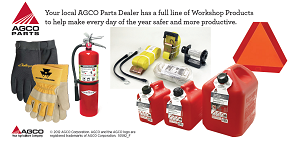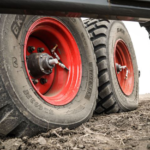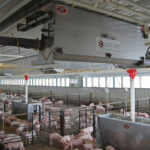7 Key Safety Tips for US Farm Safety Week
Farm safety is increasingly important as machinery becomes larger and more complex and operations work more hours per day. Accidents can not only be harmful, but can cost the farm valuable uptime needed to be successful in today’s economy. We’ve...
7 Key Safety Tips for US Farm Safety Week
Farm safety is increasingly important as machinery becomes larger and more complex and operations work more hours per day. Accidents can not only be harmful, but can cost the farm valuable uptime needed to be successful in today’s economy. We’ve... Farm safety is increasingly important as machinery becomes larger and more complex and operations work more hours per day. Accidents can not only be harmful, but can cost the farm valuable uptime needed to be successful in today’s economy. We’ve composed a few basic shop safety tips that can help ensure you return home safely every day.
Farm safety is increasingly important as machinery becomes larger and more complex and operations work more hours per day. Accidents can not only be harmful, but can cost the farm valuable uptime needed to be successful in today’s economy. We’ve composed a few basic shop safety tips that can help ensure you return home safely every day.
1. Make sure that your work or maintenance area is swept and all spills are cleaned up after working on each of your machines. Slippery floors caused by spilled oil, fuel or water are often causes of accidents. Wearing shoes or boots with treads can help prevent slipping.
2. Never climb on top of shelves, boxes, or chairs when trying to reach something high up; use a ladder that is appropriate for the situation.
3. Back muscle strains are one of the most common types of injuries, causing almost 900,000 disabling injuries each year; half of which are caused by improper techniques. You first need to look at what you are lifting and ask yourself if you think you can do it by yourself. If you have any doubts, it is much safer to ask for help than to injure yourself. Bend down at the knees instead of with your back. This allows you to keep balanced easier, have more power when lifting, and reduces the chance of straining back muscles. When lifting, tighten your stomach muscles and look straight ahead. Doing so alleviates using your back and can prevent injury. While carrying the load, hold the object as close as you can to your body as possible and set down the object by using the same technique as lifting.
4. Make sure to wear protective equipment when working on machines. Wearing protective eyewear, ear protection, gloves, and masks to protect your body from burns, cuts, dangerous chemicals and loose debris in the machinery.
5. Be aware of children and pets when moving or starting equipment. Consider purchasing an AGCO AgCam backup camera to have a clear view when maneuvering in reverse.
6. Stay out of filled grain bins and wagons to avoid entrapment and suffocation. If you must enter a grain bin, ensure that machinery is not running and locked out to keep someone from starting the equipment. Wear a harness attached to a properly secured rope and have someone supervising the process to ensure your safety.
7. Most importantly, AGCO wants to remind all farmers that proper training is the best way to ensure you and your employees are safe and help avoid accidents. Consider developing a safety program that educates all employees on the farm of potential risks and what to do if there is an accident. Spend time and walk around your farm, inspecting all equipment and machines to ensure the risk level is minimized.
What are some other ways you are focusing on safety at your farm or business?



